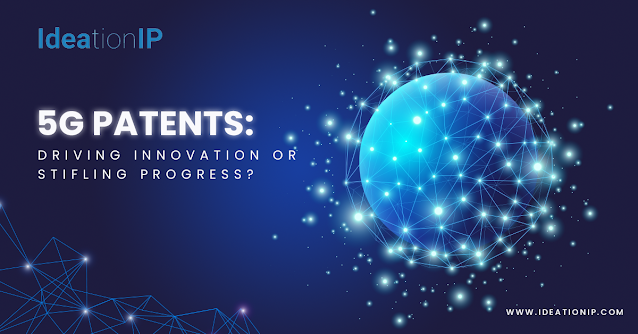5G Patents: Driving Innovation or Stifling Progress?
Introduction
The advent of 5G technology has caused a massive buzz in the
telecommunications industry, and it is expected to revolutionize the way we
communicate, work, and live. 5G technology offers faster data transfer rates,
lower latency, and increased connectivity, which makes it the ideal solution
for applications such as autonomous vehicles, IoT devices, and smart cities.
However, behind the scenes, a battle for dominance is on-going, and it is all
about patents. In this blog post, we will discuss the impact of 5G patents and
how they are shaping the technological landscape.
The Importance of 5G Patents
Patents play a critical role in the development of any technology,
and the case of 5G is no different. The vast majority of 5G technology is
patented, and owning patents can give companies significant leverage in the
industry. For instance, a company that owns a significant number of 5G patents
can dictate the terms of licensing, control the development of the technology,
and prevent competitors from gaining market share. As a result, companies such
as Qualcomm, Huawei, Nokia, and Ericsson have invested heavily in 5G patents,
with some of them owning tens of thousands of patents.
Impact on Innovation
While patents can be a tool for protecting intellectual property,
they can also stifle innovation. In the case of 5G, the high number of patents
owned by a few dominant players can limit the development of new products and
services. Start-ups and smaller companies may find it challenging to compete
with larger companies that have already secured patents on the critical
components of 5G technology. As a result, innovation in the industry may slow
down, and consumers may be left with fewer choices.
Impact on Costs
Another impact of 5G patents is on the cost of devices and services.
Companies that own patents can charge licensing fees to other companies that
want to use their technology. These fees can significantly increase the cost of
5G devices and services, making them less accessible to consumers. Moreover,
licensing fees can limit the development of new products and services, as
smaller companies may not be able to afford the fees.
The Role of Standards
Organizations
To mitigate the impact of patents on innovation and costs,
standards organizations such as the 3rd Generation Partnership Project (3GPP)
have implemented policies that require companies to license their patents on
fair, reasonable, and non-discriminatory (FRAND) terms. These policies ensure
that companies cannot abuse their patent power to dominate the industry or
stifle innovation. However, there have been cases where companies have been
accused of violating FRAND terms, leading to legal battles and delays in the
development of 5G technology.
Conclusion
5G technology is set to change the way we live and work, and
patents are playing a critical role in its development. While patents can be a
tool for protecting intellectual property, they can also stifle innovation and
increase costs. To ensure that the industry continues to thrive, standards
organizations must continue to implement policies that promote fair and
equitable access to 5G technology. Additionally, companies must collaborate and
work towards developing open standards that encourage competition and
innovation.
IdeationIP is a leading provider of patent research and analytics
services that are essential to businesses operating in the 5G telecommunication
industry. As the industry becomes more competitive and complex, companies need
to stay ahead of the curve and anticipate market trends to remain relevant.
IdeationIP can provide valuable insights into the patent landscape of 5G
technology, helping clients make informed decisions about their intellectual
property strategy.
One of the ways IdeationIP can assist clients in the 5G
telecommunication industry is through patent landscape analysis. This involves
identifying the patents that exist in a particular technology space and
analyzing their strengths, weaknesses, and licensing opportunities. By
conducting a comprehensive analysis of the 5G patent landscape, IdeationIP can
help clients understand where they stand in relation to their competitors,
identify potential infringement risks, and determine the best path forward for
their IP strategy.
Another way IdeationIP can assist clients is by providing patent
portfolio analysis. This involves assessing the strength and value of a
client's patent portfolio, identifying areas of potential growth, and
determining which patents should be prioritized for protection. In the 5G
telecommunication industry, having a strong patent portfolio is essential for
staying ahead of the competition and protecting valuable innovations.
IdeationIP can help clients develop a robust and effective patent portfolio
strategy that aligns with their business goals.
IdeationIP also offers patent infringement services, which are
particularly important in the 5G telecommunication industry. With so many
companies investing heavily in 5G technology, patent licensing has become a
critical component of IP strategy. IdeationIP can assist clients in determining
the value of their patents. By providing accurate and reliable services,
IdeationIP can help clients monetize their patents and generate revenue from
their intellectual property.
Overall, IdeationIP can help clients stay ahead of the curve and
make informed decisions about their IP strategy. With the 5G telecommunication
industry expected to grow rapidly in the coming years, working with a trusted
partner like IdeationIP can make all the difference in achieving success.



Comments
Post a Comment